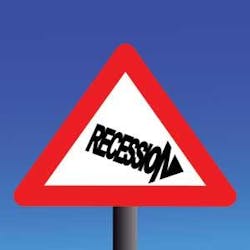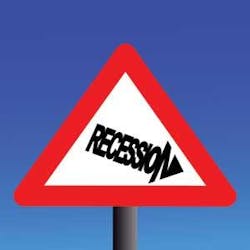Recession proofing your practice
by Michael Schuster, DDS
For more on this topic, go to www.dentaleconomics.com and search using the following key words: recession proof your practice, new state of the economy, GNP, housing crisis, maximum credit line, discretionary dollars.
What is a recession?
- Are we in one?
- How would you know?
- Who says yes? Who says no?
- What key strategies can you do now to protect yourself?
My grandfather was a dentist in Cheboygan, Mich., for more than 40 years. Something he said when I was very young has always stuck with me: "You can tell the state of the economy by the amount of loose change in a dentist's pocket."
No, we don't yet have a true recession, at least not in the classic terms of 13 quarters of declining Gross National Production (GNP). But there are many signs of an impending recession, if not a depression.
George Bush says the economy is OK, while Warren Buffet suggests that it is not. When it comes to money and economics, who do you believe? I choose Warren Buffet.
A new state of the economy
We are entering a different age, one that we have not experienced before. What worked in the past may not necessarily work in the future. America will no longer dominate the world. Our country is becoming “flatter” than ever. As I travel around the United States speaking several times a month and visiting with dentists, alumni, and friends, I have discovered several things that I want to share.
First, the impact of the current economy varies in different parts of the country. Last week I spoke with a worn-out automotive dealer software salesman. When I asked him how it was going, he said, "No sales, except where they're getting oil out of the ground." You better believe that retired people and people on lower, fixed incomes are cutting back. How much? Well, so far Americans have driven 30 billion fewer miles in 2008!
Note also, for the first time in four decades, the savings rate has climbed to 5%! People are spending less and saving more. Why? We all spend money on the hope of the future. As hope and trust decline, so does spending. Increased savings is the surest sign that people are concerned about their futures.
Second is the impact of the housing crisis. According to "age wave" theorists, the housing crisis wasn't supposed to begin until 2010 to 2012. That's when the baby boomers reach retirement age and are ready to sell their "prairie mansions" without enough money in the next generation to pay the price. No one expected this housing crisis, at least not this early. The reduction of home values has had a tremendous impact on our economy.
Third is a long overdue increase or adjustment in the price of fuel oil and oil-related energy. I suggest that any thinking person read two books: "The World is Flat," by Thomas L. Friedman, and "A Whole New Mind," by Daniel H. Pink. Everything happening with regard to the undeveloped countries of India and China is impacting the supply and demand for oil related products. The number of people driving automobiles has escalated in the past 10 to 15 years, and we can no longer artificially keep the price of energy at the low levels we have experienced here in the U.S.
Fourth, no matter your political persuasion, the dramatic increase in national debt may be the biggest travesty of governmental mismanagement that we have ever experienced, and it impacts all of us.
You might think because you practice in a small town that all this doesn't impact you, but the world is much flatter than it used to be. So I'll get back to the recession theory, but first a look at how people think and act in a recession, or at least in an uncertain economic climate.
First, people spend money on the hope of the future. When the future is questionable and uncertain, people pull back. It makes perfect sense.
Second, patients will delay or postpone treatment. If we push them, they will leave. Certainly this isn't true for everyone, but enough so that pushing will hurt you and your practice. We should be there to help people through this difficult time.
Third, what worked in the past may not work in the future. There is a definite shift in thinking and spending right now. Difficult times often produce major permanent shifts in thinking and behavior. Talk to GM, Ford, Chrysler, and even Mercedes Benz executives right now. People are waiting to purchase because they are intuitive enough to know that the winds of change are in process.
In difficult times, only the best thrive. First be prepared to survive. Whether you believe we are in a recession or not, acting like we are can't hurt, and just might make you better.
Here are eight key steps you can do right now to ensure a better future for you and your practice:
Step One — Get the maximum line of credit that you can. Remember, banks will lend you all the money you want when you don't need it, and will rarely lend when you need it most. I learned this directly from a former bank owner.
Step Two — Do not finance any major treatment yourself. Offer CareCredit or some other outside financing group. If a patient can't pay today, how do you know they can pay you tomorrow? This sounds a bit self-serving, but it is the truth. We do much better when we are completely honest.
Step Three — Pay off all short-term debt. All you have to do is pay off your credit cards. This is a guaranteed investment that is 100% safe, pays between 12% and 20%, and is income tax-free with no fees or charges. And, there is no minimum payment amount. You can start with $10.
Step Four — Offer a one time, 10% discount for payment in full on all long-term receivables. If they can't pay now, how will they pay later?
Step Five — Cut your variable expenses. You should have two budgets — a need budget for those things you absolutely must have to produce and deliver the best dentistry possible, and a wish budget for those extras that you'd like but really don't need. You must stick to your need budget. Be tight with your money.
Step Six — Get positive and active regarding your practice. A good economy masks poor management. Take the intraoral camera and turn it on yourself and your practice. Remember, no small business performs any better than the person who owns it. No matter how much you are tempted to spend on external marketing (and I'm a believer in external marketing) the best patients you'll ever have are those who have had a great and positive experience with you and your practice.
Step Seven — As the economy slows, discretionary dollars spent on dentistry decrease. You can spend this time worrying, blaming, and putting pressure on your staff or patients, or you can use this time to improve everything you do, from the very first contact to the new patient experience. You can be the leader for positive change, or you can get sucked into a negative attitude over things you can't control. Do the best you can, where you can, and take time to improve yourself as well as your practice.
Step Eight — Don't push people. Offer comprehensive examinations, diagnosis, and treatment planning. While you plan for the long haul, you'll have more patients on hold and do more phased work than in the past. Be there to help people. Dentists who love people and use things do better than those who love things and use people. This is a great time to exercise the best emotional and clinical judgment. Help people where they are, but always give them hope for a better future.
I hope this helps. In times like these I work within the same rules I've shared with you. I actually practice what I teach. No matter the future, you are always better off when you are a wise steward of your time, money, relationships, and future.
A practicing dentist, Dr. Michael Schuster founded the Schuster Center in 1978. Guiding more than 3,500 graduates to achieve wealth and freedom, the Schuster Center is the first business school created exclusively for dentists. It will celebrate 30 years this year. Dr. Schuster is a cadre and former director at the Pankey Institute, adjunct faculty at the Dawson Center, OBI, and LSU Cosmetic Continuum. Dr. Schuster can be reached at www.schustercenter.com or [email protected].

